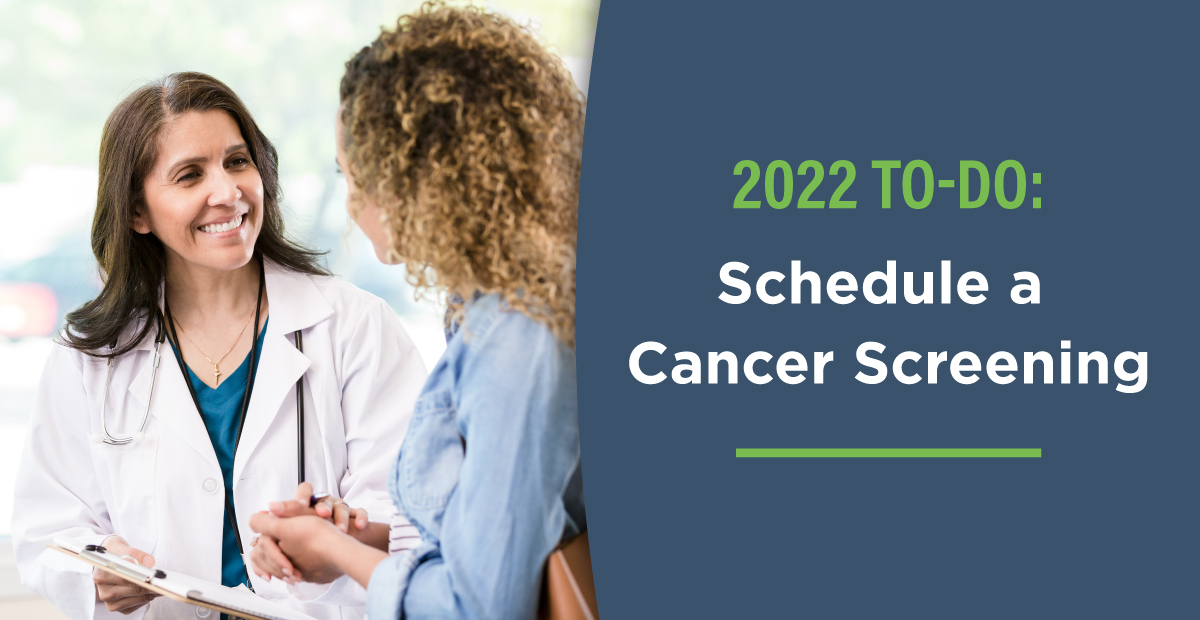
January 18, 2022
Start Off 2022 By Protecting Yourself Against More Than Just COVID-19
Don’t let the COVID-19 pandemic keep you and your loved ones from getting routine medical care. Annual wellness checks and routine screenings can identify many health issues early, including the five most aggressive types of cancer: lung, colorectal, breast, pancreatic and prostate.
Early detection is key because the quicker cancer is found, the easier it is to treat. More treatments are available for cancers detected at Stage 1 than at other stages, and survival rates are much higher. Receiving a cancer diagnosis is never easy, but early detection brings hope.
Lung Cancer
Known as the most aggressive form of cancer, lung cancer is most often caused by smoking/tobacco use. The U.S. Preventive Services Task Force (USPSTF) recently revised its recommendations on who should get a low-dose CT scan and when. Low-dose CT scans, which can detect cancer earlier, have improved survival rates for those with lung cancer, even for heavy smokers. The new recommendations take a person’s personal smoking history into account, so if you’ve ever been a smoker, even just an occasional one, check it out.
Colorectal Cancer
Most colorectal cancer cases begin as small, benign cells that become cancerous over time. Physicians use screenings, like colonoscopies, for early detection and prevention. If you’re between the ages of 45 and 75, this is a crucial test. Here’s the good news: you don’t necessarily have to go in for a colonoscopy. The USPSTF’s new recommendations say most people can start with an at-home stool test to screen for cancer. Call your doctor to find out what kind of screening is right for you and ask how you can get started.
Breast Cancer
The second most common type of cancer in women is breast cancer. Coryell Health doctors recommend women begin having annual mammograms starting at age 40. Family and personal medical history should be taken into account, so if you’re age 40 or older and haven’t had a mammogram yet, call your doctor to discuss when is the right time for you.
Coryell Health has 3D mammogram technology, which produces the clearest and most precise scans possible. For your convenience, Coryell Health Diagnostic Imaging allows you to book your appointment without seeing a provider for a referral. Call (254) 248-6238 to schedule your 3D mammogram today. One of our family medicine providers will follow up with you regarding your results.
Also, let your doctor know when you’re scheduled to receive your COVID-19 shots. One of the side-effects of the vaccine is swollen lymph nodes, which can alter your mammogram images. Most doctors recommend waiting 4-6 weeks after your COVID-19 shot to get your mammogram.
Pancreatic Cancer
Currently, there are no standard screenings for pancreatic cancer. Those with a genetic tendency for pancreatic concerns should discuss routine endoscopic ultrasounds or MRI/CT imaging with a family medicine provider.
Prostate Cancer
This is the second-leading cause of cancer deaths in men. There are two tests to check for prostate cancer: a prostate-specific antigen (PSA) test or a digital rectal examination (DRE). After a certain age, a doctor may recommend regular screening. A prostate exam can help detect cancer while it is still highly treatable, even if symptoms are not present.
Other Recommended Cancer Screenings for Adults
We also recommend HPV tests for women under 65 to screen for the human papillomavirus, a very common STD that causes warts and can be linked to cervical cancer. There are more than 3 million cases of HPV in the United States per year. To screen for it, your doctor may take a “pap smear” cytology test. Testing should be done with regularity, but your individual testing schedule is dependent on your personal medical and sexual history.
You can get an HPV vaccine to help prevent HPV and cervical cancer through the age of 45, but check with your insurance provider first, to make sure you’re covered. HPV also affects men, so young men may want to consider getting the vaccine, too.
Warning Signs
Here are some common warning signs of cancer: fatigue, weight loss, swelling or lumps in any part of the body and unexplained pains. However, many symptoms associated with cancer could also be signs of other conditions. If you’re experiencing any of these symptoms or anything unusual, schedule an appointment with your primary care physician.
 Skip to content
Skip to content
